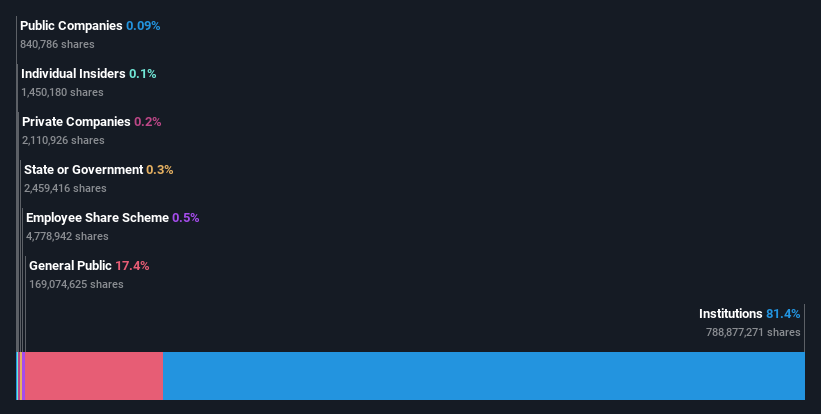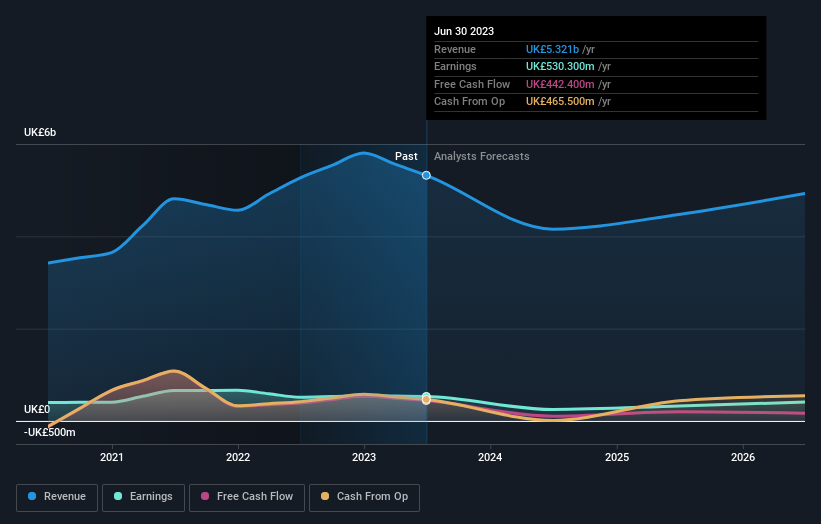- United Kingdom
- /
- Consumer Durables
- /
- LSE:BTRW
Barratt Developments plc (LON:BDEV) is favoured by institutional owners who hold 81% of the company

Key Insights
- Significantly high institutional ownership implies Barratt Developments' stock price is sensitive to their trading actions
- A total of 21 investors have a majority stake in the company with 51% ownership
- Using data from analyst forecasts alongside ownership research, one can better assess the future performance of a company
If you want to know who really controls Barratt Developments plc (LON:BDEV), then you'll have to look at the makeup of its share registry. And the group that holds the biggest piece of the pie are institutions with 81% ownership. Put another way, the group faces the maximum upside potential (or downside risk).
Since institutional have access to huge amounts of capital, their market moves tend to receive a lot of scrutiny by retail or individual investors. As a result, a sizeable amount of institutional money invested in a firm is generally viewed as a positive attribute.
In the chart below, we zoom in on the different ownership groups of Barratt Developments.
Check out our latest analysis for Barratt Developments

What Does The Institutional Ownership Tell Us About Barratt Developments?
Institutional investors commonly compare their own returns to the returns of a commonly followed index. So they generally do consider buying larger companies that are included in the relevant benchmark index.
We can see that Barratt Developments does have institutional investors; and they hold a good portion of the company's stock. This implies the analysts working for those institutions have looked at the stock and they like it. But just like anyone else, they could be wrong. If multiple institutions change their view on a stock at the same time, you could see the share price drop fast. It's therefore worth looking at Barratt Developments' earnings history below. Of course, the future is what really matters.

Since institutional investors own more than half the issued stock, the board will likely have to pay attention to their preferences. Hedge funds don't have many shares in Barratt Developments. The company's largest shareholder is BlackRock, Inc., with ownership of 8.9%. FMR LLC is the second largest shareholder owning 6.9% of common stock, and The Vanguard Group, Inc. holds about 4.7% of the company stock.
After doing some more digging, we found that the top 21 have the combined ownership of 51% in the company, suggesting that no single shareholder has significant control over the company.
While studying institutional ownership for a company can add value to your research, it is also a good practice to research analyst recommendations to get a deeper understand of a stock's expected performance. There are a reasonable number of analysts covering the stock, so it might be useful to find out their aggregate view on the future.
Insider Ownership Of Barratt Developments
The definition of company insiders can be subjective and does vary between jurisdictions. Our data reflects individual insiders, capturing board members at the very least. Management ultimately answers to the board. However, it is not uncommon for managers to be executive board members, especially if they are a founder or the CEO.
I generally consider insider ownership to be a good thing. However, on some occasions it makes it more difficult for other shareholders to hold the board accountable for decisions.
Our most recent data indicates that insiders own less than 1% of Barratt Developments plc. It's a big company, so even a small proportional interest can create alignment between the board and shareholders. In this case insiders own UK£7.7m worth of shares. It is good to see board members owning shares, but it might be worth checking if those insiders have been buying.
General Public Ownership
The general public-- including retail investors -- own 17% stake in the company, and hence can't easily be ignored. This size of ownership, while considerable, may not be enough to change company policy if the decision is not in sync with other large shareholders.
Next Steps:
While it is well worth considering the different groups that own a company, there are other factors that are even more important. For instance, we've identified 2 warning signs for Barratt Developments (1 is a bit unpleasant) that you should be aware of.
If you are like me, you may want to think about whether this company will grow or shrink. Luckily, you can check this free report showing analyst forecasts for its future.
NB: Figures in this article are calculated using data from the last twelve months, which refer to the 12-month period ending on the last date of the month the financial statement is dated. This may not be consistent with full year annual report figures.
Valuation is complex, but we're here to simplify it.
Discover if Barratt Redrow might be undervalued or overvalued with our detailed analysis, featuring fair value estimates, potential risks, dividends, insider trades, and its financial condition.
Access Free AnalysisHave feedback on this article? Concerned about the content? Get in touch with us directly. Alternatively, email editorial-team (at) simplywallst.com.
This article by Simply Wall St is general in nature. We provide commentary based on historical data and analyst forecasts only using an unbiased methodology and our articles are not intended to be financial advice. It does not constitute a recommendation to buy or sell any stock, and does not take account of your objectives, or your financial situation. We aim to bring you long-term focused analysis driven by fundamental data. Note that our analysis may not factor in the latest price-sensitive company announcements or qualitative material. Simply Wall St has no position in any stocks mentioned.
About LSE:BTRW
Barratt Redrow
Engages in the housebuilding business in the United Kingdom.
Excellent balance sheet with reasonable growth potential.
Similar Companies
Market Insights
Community Narratives





